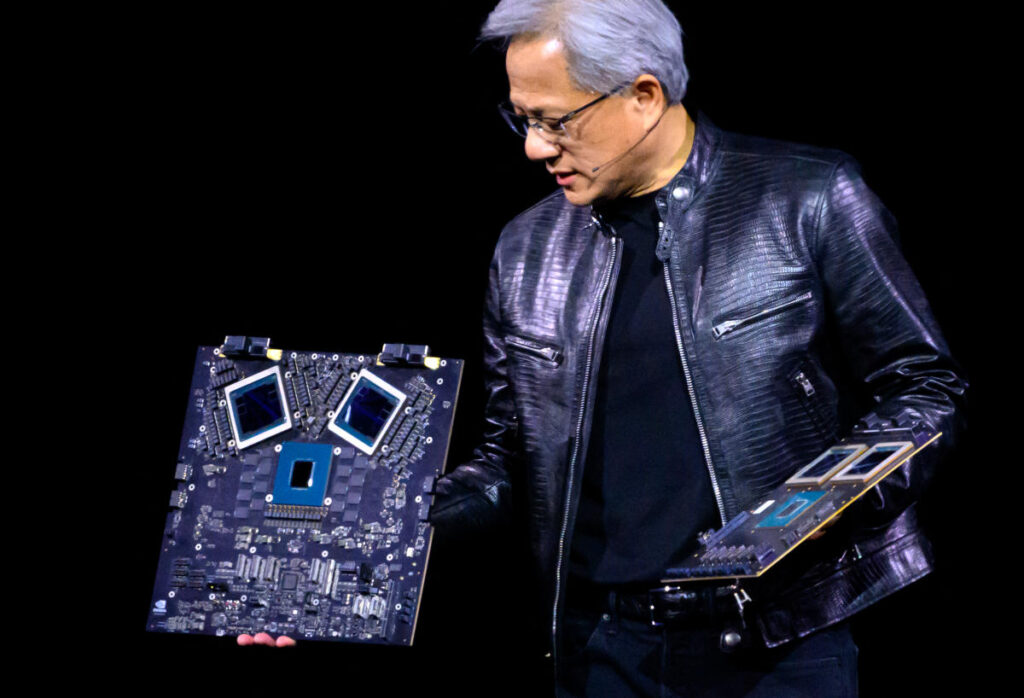Nvidia (NVDA) CEO Jensen Huang has no shortage of demand. What he lacks is supply.
In an exclusive interview with Yahoo Finance after the company's first-quarter earnings report on Wednesday, Huang said demand has slowed as the company transitions between its current and next-generation AI chips. He denied concerns that he might do so.
“People want to deploy these data centers now,” Huang said. “They are our [graphics processing units] Get to work, earn money and start saving now, the demand is very strong.”
Nvidia is moving away from its current Hopper AI platform to the more advanced Blackwell system, and ahead of the company's earnings report on Wednesday, some Wall Street analysts wondered whether some clients might be wary of ordering Hopper ahead of a ramp-up in the Blackwell unit later this year.
“After the Blackwell announcement, demand for hoppers increased throughout the quarter, so this tells you how much demand there is,” Huang said.
Huang added that demand for both platforms will exceed supply until next year, and the complexity of these chips will also pose a challenge for the company to address.
“Every single component, every single part of our data center is the most complex computer the world has ever built,” Huang said. “So it makes sense that there are constraints on just about everything.”
For the first quarter, NVIDIA reported results that beat Wall Street expectations, reporting adjusted earnings per share of $6.12 and revenue of $26 billion, up 461% and 262%, respectively, from the prior year. First-quarter non-GAAP operating income reached $18.1 billion.
This quarter, Nvidia expects revenue to hit $28 billion, plus or minus 2%. This is higher than the $26.6 billion expected by analysts.
The company also announced a 10-for-1 stock split, in which shareholders will receive 10 shares for every share of the company they currently own, effective June 10th for current shareholders as of June 7th.
Nvidia also joined other big tech companies in increasing its quarterly dividend, with shareholders receiving an increase of $0.10 per share from $0.04.
Nvidia stock rose as much as 6% in extended trading on Wednesday.
Huang also discussed how Nvidia is moving from AI training, where companies train AI models, to AI inference, where those same companies deploy models that customers can use.
Questions are swirling about whether big cloud providers like Microsoft (MSFT), Google (GOOG, GOOGL) and Amazon (AMZN) will phase out Nvidia chips for inference in favor of their own products.
But Huang believes Nvidia's product is just as powerful for inference as it is for training.
“We're in a great position in inference, because inference is a really complicated problem,” he said.
“The software stack is complex. The types of models people are using are complex. The majority of inference today is done by Nvidia, so we expect that to continue.”
The CEO also touched on the company's growing sales to customers outside of the big cloud service providers like Amazon, Microsoft and Google, saying that companies ranging from Meta (META) and Tesla (TSLA) to pharmaceutical companies are increasingly buying Nvidia's chips. In fact, aside from cloud companies, the biggest industry using Nvidia's data center chips is automotive.
“Tesla is way ahead in self-driving cars,” Huang said, “but every car will have to have self-driving capabilities at some point.”
Click here for the latest technology news impacting the stock market.
Read the latest financial and business news from Yahoo Finance


